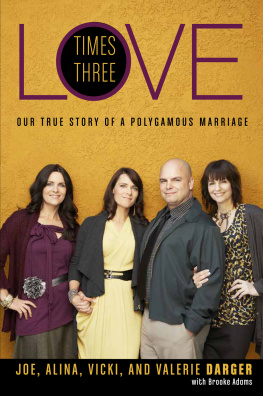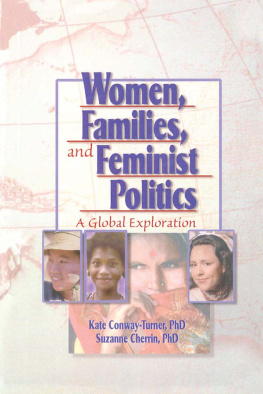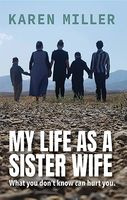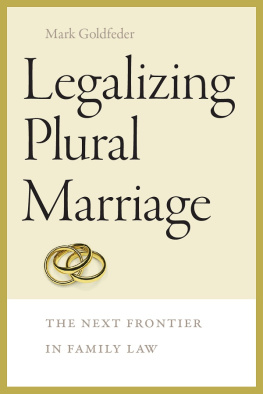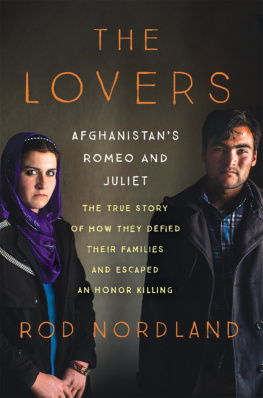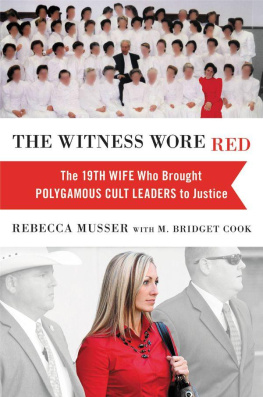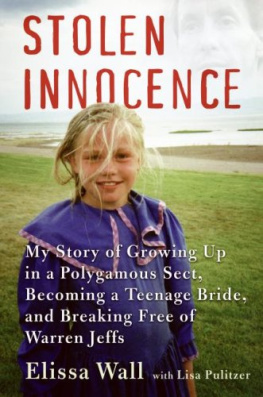Love Times Three
Our True Story of a Polygamous Marriage
Joe, Alina, Vicki, and Valerie Darger
with Brooke Adams

Contents
I N THE PAST , people like us who have polygamous relationships have zealously guarded their privacy and sought to stay out of the public spotlight due to this lifestyles criminal status. We have stayed silent despite widespread misperceptions, mistreatment, and intolerance. To speak up is to risk persecution, prosecution, and, because of discrimination, economic hardship. We have carried the fragile hope that our silence will allow us to avoid unfair treatment. As a family, we have come to see that as unproductive and naive.
Real and fictional events have combined to create a public portrait of our culture that is often inaccurate and at times harmful, which has led to our decision to share our story despite the risks. We hope to correct fallacies spread through statements that typically begin, All polygamists are...a blank filled in with abusive, uneducated, oppressed, and numerous other pejorative terms. Such broad-brush swipes are no more accurate than characterizing all monogamists based on the abusive behavior of actor Charlie Sheen or the infidelity of golfer Tiger Woods.
In speaking about our lives, we do not mean to deny the voice of others who have had a bad experience in polygamy; as with monogamy, there are some plural marriages that dont work out, and there are practices in some groups that we dont agree with or believe are in keeping with the ideals of our faith. Nor do we claim to represent any other familys experience, though we know many families who, like us, have successful, faith-based plural marriages. This is simply our truth.
In telling our story, we relied on journals, family histories, our own memories, and individual interpretations of certain events. We have withheld names of some individuals to protect their privacy.
We want to be clear on one point: we are Independentsthe largest category of Fundamentalist Mormons, who believe plural marriage is an essential religious tenet. Historical roots aside, we have no association whatsoever with any organized polygamous group or with the Church of Jesus Christ of Latter-day Saints (LDS). Since 1890, the LDS Church has issued numerous official declarations and statements denouncing plural marriage and has disavowed any connection with fundamentalists.
Some have asked whether polygamy is viable in our modern culture. Our answer? Yes, absolutely. Ours is an example of a family created by consenting adults for whom this lifestyle works. At its core, this is a love story about people who came together to create a family that would support, nurture, and sustain each member.
Every day, people make bonds and blend relationships in ways that are redefining what it means to be family. Our particular redefinition is nothing new, however: polygamy is the most widespread family structure in the world, permissible in more cultures historically than any other. In choosing plural marriage, we have found purpose that goes beyond ourselves, sometimes in ways we never could have imagined as we built a family based on the most traditional of values: faith, love, loyalty, and unconditional acceptance.
The Dargers
Introduction
A Matter of Principle
Nothing in life is to be feared, it is only to be understood.
MARIE CURIE
Joe
T HE HOUSE WAS QUIET , the younger children finally in bed, as I made my way to the family room and turned on the television. For weeks, I had been hearing about the finale for the first season of HBOs series about polygamy, Big Love . That evening, as the episode began, I felt a panicky, butterflies-in-the-stomach sensation. HBO was about to showcase an event plucked from my own life.
I am a polygamist. I live in a suburb of Salt Lake City, Utah, with my three wivesAlina, Vicki, and Valerieand our twenty-three living children. I own a business, coach Little League sports teams, and am heavily involved with my extended family. But I bet you are stuck on that first sentence. Yes, I am a polygamist.
I am what some refer to as a Joseph Smith Mormonin other words, I am part of the religious movement known as Mormonism but I do not belong to any church or follow any leader. Some people erroneously refer to me as a polygamist the same way someone else might be called a Catholic or a Buddhist. But there is much more to my beliefs than the way Ive chosen to structure my family.
Many people are surprised when they meet us and learn we are polygamists. Strangers expect my wives to be dressed in conservative clothing and have their hair in French braidsnot dressed fashionably, with stylish haircuts and makeup, jobs, and children in public school. The fact is, a majority of polygamous families are just as mainstream as we are.
Alina, Vicki, and I have been married more than twenty-one years; Valerie joined the family eleven years ago, bringing five children from her first marriage. Our lives revolve around our Fundamentalist Mormon faith and our children. And we do have a bunch of them! We have six college-age children, fourteen children in grade school, and three preschoolers, including Victoria, who at one is the newest addition to the family. We sometimes need a dolly to hold the groceries during weekly shopping trips to Costco. Sunday brunches are huge affairs that typically involve five dozen eggs, gallons of milk and juice, and too many waffles to count. My weekend Honey-Do list is often pages long, and my wives have had to become master strategists in order to keep track of who needs to be where and when. My family may be bigger than most and my relationships more complex (I have to admit I sometimes have trouble tracking whose turn it is for date night), but in reality our lives arent much different from those of our neighbors.
I dont have time to watch much television, and, to be honest, I dont care for the content of most cable shows. If it werent for the P word, I wouldnt have been tuning in to HBO that night in June 2006. In fact, I was shocked when I first learned HBO was doing a series about a polygamous family, and I expected the worst. I figured the show would make us out to be a bunch of kooks. At the time, there was a lot of national media attention focused on a polygamous sect in Utah whose leader had been accused of crimes and was then in hiding.
But my curiosity about the show, and my hope that it would offer a fair treatment of my culture, increased when I learned that Big Love creators Mark V. Olsen and Will Scheffer drew some of their inspiration from a magazine called Mormon Focus . The first cover issue shows, virtually, this familythe suburban integrated family. So its not a concoction, Olsen told media during a publicity tour for Big Love .
There was only a single issue of Mormon Focus published (in 2003), and it featured my three wives on its cover. Two stories in the magazine, intended for a Fundamentalist Mormon audience, were about my family, though we were identified only by pseudonyms. Wed agreed to participate in the debut issue after praying about it as a family, and we were scared about the fallout. But there wasnt any, at least not as far as we could tell. When the magazine folded after that initial issue, we wondered why wed been so strongly inspired to do it. Now, several years later, was Big Love our answer? There was no doubt that the show was going to bring polygamy into the public sphere, probably in ways we never could have imagined.
So I knew that the shows creators were familiar with how our family lived. But as Big Love rolled out in 2006, I was unnerved. With each new episode I wondered, Who is the inside person feeding them information? Much of what was depicted in the series about the main character and his family seemed to parallel and even mirror my life, to the extent that, no matter how strongly we denied it, many friends and relatives assumed we were secret informants for the show. No one in my family had met with or spoken to Big Love s creators or any of its staff. But still the suspicion that we were involved grew, especially among fundamentalists who were uncomfortable with the shows portrayal of our lifestyle. And then came the season-one finale, titled The Ceremony, in which the polygamous lifestyle of one wife is revealed after she is named a Beehive Mother of the Year.
Next page
